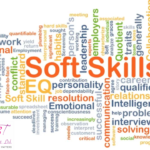In a recent workshop focused on cultivating skillful leadership through interpersonal competencies, I emphasized the pivotal role of relationships as an amalgamation of words, actions, and thoughts. When all three components align positively, relationships thrive; however, negativity in any aspect—such as sarcasm, insensitivity, or harboring negative thoughts—can tarnish even the strongest of bonds. The challenge lies in understanding how unspoken negativity can erode relationships, given the intangibility of thoughts. Soft skills training endeavors to enhance the communication capabilities of students and professionals alike, facilitating harmonious relationships both in professional environments and personal domains of individuals.
Effective soft skill communication involves cultivating empathy over sympathy. By adopting an empathetic approach towards colleagues and neighbors, we foster stronger interpersonal connections, reduce stress levels, and create an environment conducive to heightened creativity and overall well-being. But how does one cultivate empathy?
Firstly, active listening serves as a cornerstone. Beyond merely hearing words, active listening engages the mind to comprehend the speaker’s situation fully. This practice fosters perspective-taking, allowing individuals to appreciate diverse viewpoints and respond accordingly. Integrating both cognitive and emotional aspects into communication underscores high emotional intelligence (EQ), enabling individuals to respond with compassion and understanding, thereby nurturing better interpersonal bonds.
Secondly, fostering empathy involves identifying common ground with others. Activating mirror neurons facilitates this process, as witnessing someone else’s experiences elicits a mirrored emotional response within ourselves. By recognizing shared experiences—such as parenthood, professional challenges, or personal losses—we can extend genuine support and empathy, fostering stronger connections, especially in workplace settings.
Thirdly, interpersonal skills development necessitates avoiding premature judgments and assumptions. Embracing emotional contagion enables individuals to empathize authentically with others’ emotions, thereby fostering deeper connections. By refraining from hasty judgments and embracing emotional resonance, individuals can cultivate trust and rapport, leading to enriched relationships.
In essence, nurturing positive interpersonal relationships—both professionally and personally—is a critical aspect of leadership development and soft skills training. Building strong relationships, whether at work or in our personal lives, is crucial for becoming better leaders. When we form real connections with others, it brings us a sense of peace and happiness. This highlights how important it is to communicate well and get along with people in today’s leadership roles.



